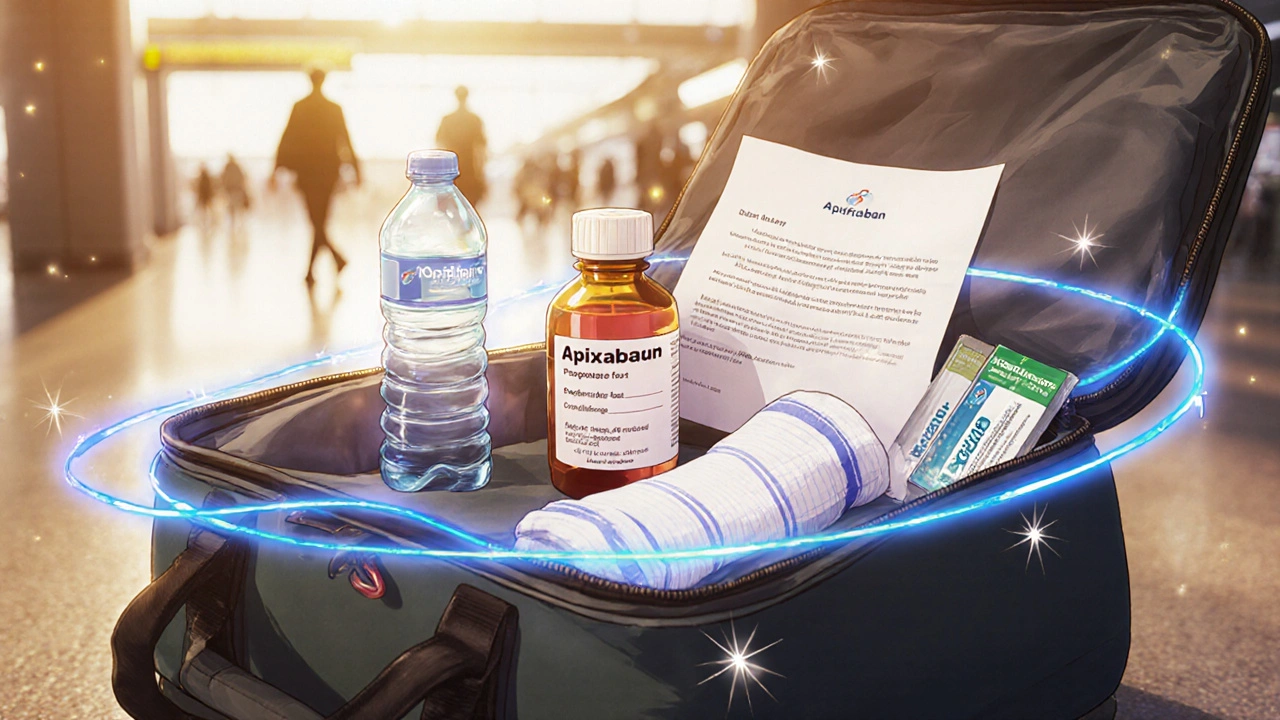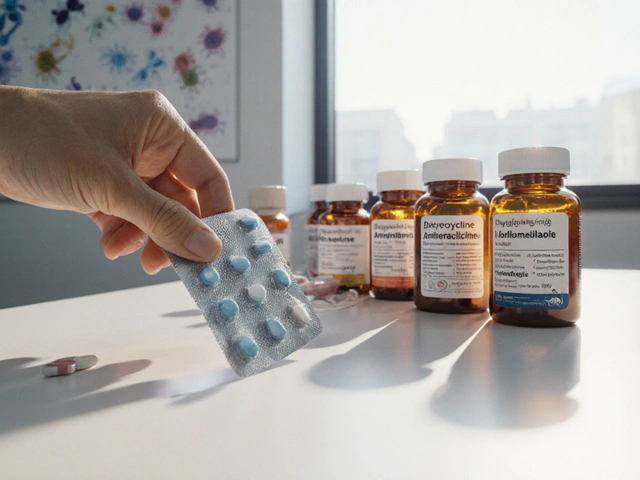If you’re taking apixaban (Eliquis) and planning a trip, you’re not alone. Thousands of people with atrial fibrillation, deep vein thrombosis, or pulmonary embolism travel safely every year while on this blood thinner. But skipping a dose, forgetting your pills, or getting stuck in a delay can turn a vacation into a medical emergency. The good news? With the right prep, you can travel confidently-no matter if you’re flying to Florida, taking a road trip across Canada, or exploring Europe.
Know Your Dose and Schedule
Apixaban is usually taken twice a day, about 12 hours apart. That’s simple at home, but time zones, jet lag, and disrupted routines make it tricky on the road. Missing a dose raises your risk of clotting. Taking two doses by accident increases bleeding risk.
Set two phone alarms-don’t rely on memory. Label your pill organizer with AM and PM. If you’re crossing time zones, keep your original time zone schedule. For example, if you take your pills at 8 a.m. and 8 p.m. Eastern Time and fly to California, still take them at 8 a.m. and 8 p.m. Eastern. Don’t adjust to local time until you’re settled. This keeps your drug levels stable.
Traveling for more than a week? Bring extra pills-enough for 10-14 days beyond your planned return. Delays happen. Lost luggage happens. Don’t gamble on getting refills abroad.
Carry Your Medication the Right Way
Never pack apixaban in checked luggage. Airlines lose bags. Temperatures in cargo holds can damage medication. Always carry your pills in your carry-on.
Keep them in their original prescription bottle. It shows your name, the drug name, and the doctor’s info. Security officers may ask to see it. If you use a pill organizer, keep the original bottle nearby for proof.
Bring a copy of your prescription or a letter from your doctor. It doesn’t need to be fancy-just a note on letterhead saying you’re prescribed apixaban for [condition], and the dosage. This helps if customs asks or if you need emergency care abroad.
Plan for Air Travel
Long flights increase the risk of blood clots, especially if you’re already on a blood thinner. Apixaban reduces that risk, but sitting still for hours isn’t safe for anyone.
Get up and walk the aisle every hour. Do seated leg lifts: point your toes up, then down. Squeeze your calves. Drink water. Avoid alcohol and excessive caffeine-they dehydrate you and make clots more likely.
Compression socks? They’re not required, but many people on apixaban find them helpful, especially on flights longer than 4 hours. They don’t replace your medication, but they add an extra layer of protection.

What If You Bleed?
Apixaban makes you bleed more easily. A small cut might take longer to stop. A bump on the head? Don’t ignore it.
Carry a medical alert card or wear a bracelet that says “On Apixaban.” It tells first responders you’re on a blood thinner-no need to guess. In an emergency, seconds matter.
If you have a serious fall, head injury, or uncontrolled bleeding (like nosebleeds lasting over 10 minutes, blood in urine or stool, or vomiting blood), seek help immediately. Don’t wait. Hospitals abroad have protocols for reversing anticoagulants. Apixaban’s effects wear off faster than warfarin, but you still need medical care.
Drug Interactions and Food
Unlike warfarin, apixaban doesn’t react with vitamin K-rich foods. You can eat spinach, kale, broccoli-no need to count servings. That’s one less thing to stress about while traveling.
But some medications can interfere. Common over-the-counter painkillers like ibuprofen or naproxen increase bleeding risk. Stick to acetaminophen (Tylenol) for headaches or muscle pain. Always check with a pharmacist before taking any new pill, even herbal supplements. St. John’s wort, for example, can make apixaban less effective.
If you’re traveling to a country where you don’t speak the language, download a translation app or write down your medications in the local language. Include: “I take apixaban. Do not give me ibuprofen or aspirin.”
Emergency Contacts and Local Care
Before you leave, get your doctor’s contact info and a list of nearby hospitals at your destination. Save them in your phone and write them on paper. If you’re going to Europe, look up the European Emergency Number: 112. It works in all EU countries.
Know your insurance coverage. Does it cover emergency care abroad? Some travel insurance plans exclude pre-existing conditions. If you’re unsure, call your insurer and ask: “Does my plan cover emergency treatment for anticoagulant-related issues while traveling?”
Keep a list of your medical conditions, allergies, and current meds-including apixaban’s dose and schedule. This saves time if you end up in an ER. Many hospitals use digital records now, but not all. Be ready to explain your situation clearly.

What About Refills Abroad?
Getting apixaban refilled overseas is nearly impossible. It’s not available under the same brand name everywhere. Even if you find Eliquis, pharmacies won’t refill a foreign prescription without a local doctor’s approval.
Don’t try to buy apixaban online from a foreign website. Many are scams. You could get fake pills or wrong doses. Your health isn’t worth the risk.
Instead, plan ahead. Ask your pharmacy to dispense a 90-day supply before you leave. That’s often covered by insurance. If you’re going for longer than three months, talk to your doctor about arranging a prescription transfer with a clinic near your destination. Some international clinics work with Canadian or U.S. providers for continuity of care.
Real-Life Scenario: A Trip to Italy
Last spring, a 68-year-old from Toronto flew to Rome for two weeks. She took her apixaban as usual-two 5 mg tablets, morning and night. She set alarms, packed extra pills, wore a medical alert bracelet, and carried her prescription letter.
On day 10, her flight was delayed by 8 hours. She didn’t panic. She walked the terminal every hour, drank water, and took her next dose on schedule. When she got home, she had no clots, no bleeding, and no stress.
She didn’t need to change her routine. She just planned.
Final Checklist Before You Go
- Bring 2 weeks’ extra apixaban beyond your trip length
- Keep pills in carry-on, in original bottle
- Carry a doctor’s note or prescription copy
- Set phone alarms for doses
- Wear a medical alert bracelet or card
- Know your emergency contacts and local hospital
- Use acetaminophen for pain-no NSAIDs
- Walk every hour on flights
- Stay hydrated, avoid alcohol
- Don’t refill abroad-plan ahead
Traveling with apixaban isn’t about restrictions. It’s about smart habits. You don’t need to cancel your plans. You just need to be prepared. The same rules that keep you safe at home work just as well on the road.
Can I drink alcohol while taking apixaban during travel?
Moderate alcohol is generally okay, but it increases bleeding risk. Stick to one drink a day-no more. Avoid binge drinking, especially in unfamiliar settings. Alcohol can also dehydrate you, which raises your risk of clots. If you’re flying or driving long distances, skip it entirely.
What should I do if I miss a dose of apixaban while traveling?
If you miss a dose, take it as soon as you remember-but only if it’s within a few hours of your scheduled time. If it’s been more than a few hours, skip the missed dose and take your next one at the regular time. Never double up. If you’re unsure, call your doctor or a local pharmacist. Most clinics have after-hours lines for patients on blood thinners.
Is apixaban safe for international travel?
Yes, apixaban is safe and often preferred for travel because it doesn’t require regular blood tests like warfarin. It’s stable, has fewer food interactions, and its effects wear off faster if you have bleeding. As long as you follow the safety tips-carrying your meds, avoiding NSAIDs, staying hydrated-you can travel anywhere with confidence.
Can I take apixaban with other medications like antibiotics?
Some antibiotics, like clarithromycin and fluconazole, can increase apixaban levels and raise bleeding risk. Others, like rifampin, can make it less effective. Always tell any doctor or pharmacist you’re on apixaban before starting a new drug-even for a short course. If you get sick while traveling, don’t self-medicate. Ask for help.
Do I need to tell airport security I’m on apixaban?
No, you don’t need to announce it. But if security asks about your pills, show them the original bottle and your prescription letter. Apixaban won’t set off alarms-it’s not a controlled substance. Just be ready to explain what it is if asked. Keep your meds in your carry-on, and you’ll breeze through security.








14 Comments
Emmalee Amthor
October 31, 2025 AT 18:25just took my apixaban before boarding and forgot my damn pills in checked luggage last year-don’t be me. carry them in your bra if you have to. i did. no regrets.
Mike Laska
October 31, 2025 AT 23:34bro i flew to thailand with apixaban and the TSA agent asked if it was ‘that blood thinner stuff’ and i just nodded like a champ. no drama. no panic. just carry the bottle, look calm, and walk away. they don’t care as long as you’re not hiding a bomb.
Saumyata Tiwari
November 2, 2025 AT 06:58how can you trust american pharmaceuticals when your own government can’t even regulate the price of insulin? apixaban is overpriced, overhyped, and overprescribed. in india, we manage atrial fibrillation with turmeric, yoga, and discipline-not corporate pills wrapped in glossy labels.
Caitlin Stewart
November 3, 2025 AT 07:13my mom takes apixaban and traveled to japan last year. she set alarms, packed extra, wore her bracelet, and still had tea with strangers in kyoto. she didn’t change a thing about her routine-just brought more planning than most people bring snacks. you don’t need to be a medical expert to travel safely. just be a little organized.
Ajay Kumar
November 5, 2025 AT 04:04you people are so obsessed with apixaban like it’s some magic bullet. what about the fact that 78% of people on anticoagulants still get clots or bleeds? you think carrying a pill bottle and walking the aisle is enough? what about the fact that airlines don’t even have defibs on half their planes? you’re not ‘safe’-you’re just delusional with a prescription. and don’t get me started on how the pharma industry markets this stuff to scared old people. it’s a racket. they don’t want you to know about natural alternatives like nattokinase, garlic, and fasting. no, you gotta buy the brand-name pill. sad.
Anthony Tong
November 5, 2025 AT 10:45the notion that apixaban is ‘safe for international travel’ is a dangerous oversimplification. the FDA has no jurisdiction abroad. Pharmacies in 80% of countries do not stock Eliquis. The claim that ‘you can travel anywhere with confidence’ is not merely misleading-it is reckless. Furthermore, the assertion that ‘apixaban’s effects wear off faster than warfarin’ is statistically inaccurate in real-world scenarios involving renal impairment, which affects 30% of elderly travelers. This article reads like a pharmaceutical whitepaper disguised as public service.
Melissa Kummer
November 5, 2025 AT 11:10Thank you for this comprehensive guide. I am a nurse practitioner and I cannot express how vital this information is for our patients. The emphasis on carrying original prescriptions, avoiding NSAIDs, and maintaining hydration is absolutely critical. I will be sharing this with my entire anticoagulation clinic. You have done an exceptional job distilling complex medical guidance into accessible, actionable steps. 🙌
Leslie Schnack
November 6, 2025 AT 22:25if you’re going to europe and get sick, can you just walk into any hospital and say ‘hi i’m on apixaban’ and they’ll know what to do? or do you need a translator app for that too? also, what’s the half-life again? i keep forgetting.
Roy Scorer
November 8, 2025 AT 05:31you know what’s really dangerous? trusting a blog post written by someone who probably just got diagnosed last month. apixaban isn’t a ‘lifestyle product.’ it’s a life-or-death medication. and now you’re telling people to ‘just walk around the terminal’ like it’s a spa day? what if you’re 80 and can’t walk? what if you have arthritis? what if you’re in a wheelchair? this isn’t ‘smart habits’-this is toxic positivity wrapped in a medical checklist. you’re making people feel guilty for being human.
Zachary Sargent
November 9, 2025 AT 11:20so i missed my dose on a flight from atlanta to denver because the wifi died and my phone died and i was too busy crying over my expired snack. i panicked. i didn’t double up. i just sat there and stared at the ceiling. i’m still alive. i think. send help.
Eileen Choudhury
November 9, 2025 AT 17:19just got back from a 3-week trip to goa! i packed 50 extra pills, wore my bracelet, and even printed out a little card in hindi that says ‘I take apixaban. Do not give me ibuprofen.’ the local pharmacist smiled and gave me chai. we didn’t speak the same language, but we understood each other. travel isn’t about perfection-it’s about connection. and a little prep goes a long way. 🌏❤️
Alexa Apeli
November 10, 2025 AT 08:09so proud of you for sharing this! 🌟 I’m a 62-year-old grandma who just took her first international trip in 15 years and I followed every tip. I even labeled my pill organizer with emojis: 🌞 for morning, 🌙 for night. I made it to Paris, drank coffee, danced a little, and came home with zero clots and zero regrets. You’re not broken because you need meds-you’re brave because you keep living. 💪❤️
Hazel Wolstenholme
November 10, 2025 AT 09:42While your checklist is superficially competent, it lacks epistemological rigor. You assume the reader possesses baseline medical literacy, yet fail to address pharmacokinetic variability across ethnicities-particularly in South Asian populations where CYP3A4/5 polymorphisms alter apixaban metabolism by up to 40%. Furthermore, your dismissal of ‘herbal supplements’ is reductive. Curcumin’s antiplatelet effects are documented in the British Journal of Clinical Pharmacology, yet you reduce them to ‘St. John’s wort’-level caricature. This is not guidance-it’s pharmaceutical propaganda dressed in wellness aesthetics.
Marcia Facundo
November 12, 2025 AT 00:50i read this whole thing and still don’t know if i can drink wine on the plane. i’m just gonna have two. if i bleed out, at least i died happy.